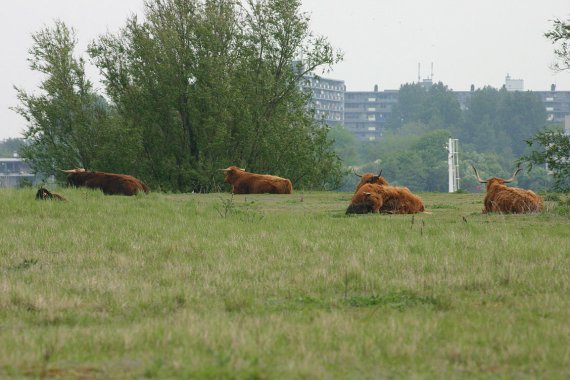Because resilience is central in the future, says PhD candidate Marjolein Sterk in her thesis that she defended on Tuesday. According to her, the naturally present resilience that awaits in ecosystems should be the basis of nature conservation. ‘Nature is inherently dynamic. It does not want to be controlled’, she explains. ‘Nature changes, which is good. We need to learn to trust in the resilience of nature.
The question is how you can use the resilience nature conservation. Which characteristics of plants and animals causes an ecosystem to be resilient? And which boundary conditions does a landscape provide?’ Core concept is that resilient thinking is the ability for plants and animals to adapt. ‘I have looked at functional features of plants and butterflies and what the characteristics explain about their role in the ecosystem concerning resilience.’
Sterk studied wetlands in the Weerribben and floodplains of the Maas. With statistical equipment she searched for relationships between characteristics of plants (number of seeds, leaf surface, height, etc.) and the environmental conditions in which those plants existed. Knowledge on the relationships make it theoretically possible to predict how ecosystems respond to disruptions. And thus to support resilience. Her results show that for good resilience, processes at different scales in space and time are important.
An example of nature restoration that according to Sterk has proven to be successful is the nature development in the floodplains of the Maas. By digging, among other, bypasses and relief a heterogeneous floodplain was made. ‘It is phenomenal what you can find there. A mix of species which are well protected against flooding or not at all, but that do need the flooding to distribute themselves. With natural grazing you can achieve a beautiful array of strategies which together form a resilient system.’
Disruptions are good, is one of Sterks conclusions. Resilience benefits from small and sometimes big disruptions. ‘A disruption puts the system back and puts the ecological memory back into operation. Seeds that are present in the ground or supplied from elsewhere get a chance. A swamp must occasionally even fall dry. This cannot hurt a resilient system. Similar to a forest fire once in a while. In our country we allow nature far too little chance to take its course.
In addition, according to Sterk we must get rid of postzegelnatuur (postage stamp sized nature). ‘All those small nature areas with each their own management type and target species. That is a typical Dutch interpretation of European policy. We must work towards thinking in terms of resilience. Do not only look at your own region, but also at the opportunities in the surroundings. Nature organizations should increase working together and with other parties.

